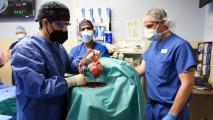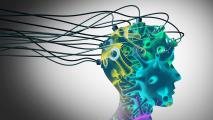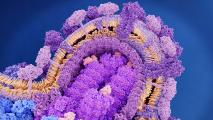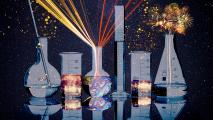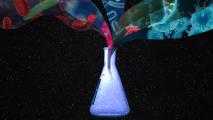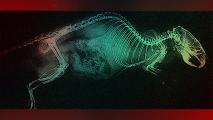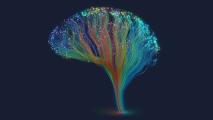
Biotech
Human history has been all but defined by death and disease, plague and pandemic. Advancements in 20th century medicine changed all of that. Now advancements in 21st century medicine promise to go even further. Could we bring about an end to disease? Reverse aging? Give hearing to the deaf and sight to the blind? The answer may be yes. And soon.
More
Scientists discover possible precursor to a Parkinson’s drug
Scientists have optimized a peptide known to prevent the “protein misfolding,” that causes Parkinson’s disease. This could be a precourser to a disease treatment.
You can finally order free COVID-19 tests online
Every American household can now request four free COVID-19 tests from the U.S. government using a newly launched website.
Morning glories may be a source of new psychedelics and medicines
Researchers have found that the symbiotic relationship between a fungus and a morning glory holds the potential for new psychedelic compounds and medicines.
Surgeons transplant pig heart into Maryland man
A pig heart is now beating in the chest of a man in Maryland, marking a huge step forward for xenotransplantation research.
Here is how your brain understands one voice in a crowd
Researchers from the University of Rochester Medical Center have discovered fresh insight into how the brain might deliberately hear one speaker while shutting out or ignoring another.
Traditional Thai cannabis cooking is back on the menu
Cannabis cooking has long simmered in Thailand. With the ruling junta’s new drug policies, the traditional dish is now making its way onto restaurant plates.
Researchers are testing neural stimulation as a long COVID treatment
Small pilot trials of two different types of external electrical brain stimulation suggest the technique may work as a long COVID treatment.
Researchers find a new target for a universal flu vaccine: the “anchor”
There’s a new target in the battle for a universal flu vaccine: the “anchor,” a part of the virus’ proteins less likely to mutate.
What HIV & Amish DNA can tell us about staying healthy longer
Northwestern University has launched a new longevity research center where scientists will look for ways to combat biological aging.
India authorizes “world’s COVID-19 vaccine,” created in Texas
India has just become the first nation to authorize a cheap and easy to manufacture new COVID-19 vaccine called Corbevax.
HIV prevention injection approved by FDA
The FDA has approved Apretude, an HIV prevention injection that replaces daily PrEP pills with a single shot every 60 days.
This robotics lab wants to develop the dream surgery
Chicago’s Surgical Innovation Training Lab is developing the robots, surgeons, and digital surgeries of the future.
Reasons to be optimistic in 2022
It can be tough to feel positive after the past two years. But a closer look at the recent past provides reasons for optimism in 2022 and beyond.
5 clinical trials may bring new hope in 2022
Vaccines, gene therapies, and even an anti-aging pill: These are the clinical trial results we are looking forward to in 2022.
Top 4 biotech breakthroughs of 2021
New biotechnology breakthroughs took on viruses, parasites, and genetic diseases this year.
Should psychedelics be patented?
The issue of patents has riven the psychedelic field. A lawyer’s repository of psychedelic info may make sure the new field stays fair.
Blocking an immune system protein helped mice recover from brain injury
Blocking an immune system molecule that accumulates after traumatic brain injury could significantly reduce the injury’s detrimental effects
What the ancient, alien jellyfish can tell us about the human brain
The jellyfish nervous system, revealed by glowing genes, may help unlock the secrets of how our own brain evolved.
Brain wrinkles and folds matter – researchers are studying the mechanics of how they form
Brain folding is another poorly understood mechanism of the most complex known structure in the universe.
The DMT ‘elves’ people meet while tripping
Why do so many people encounter these ‘elves’ after smoking large doses of DMT?
Get inspired with the most innovative stories shaping the world around us.
















